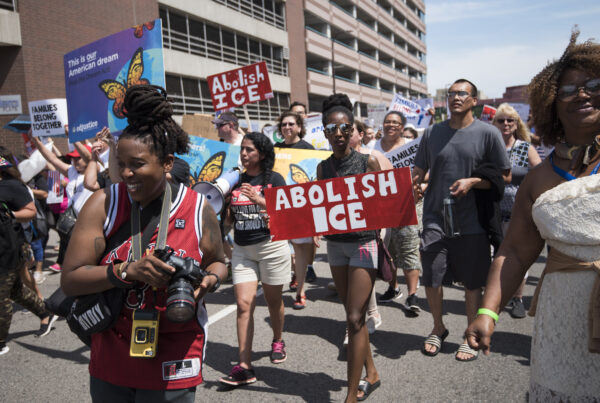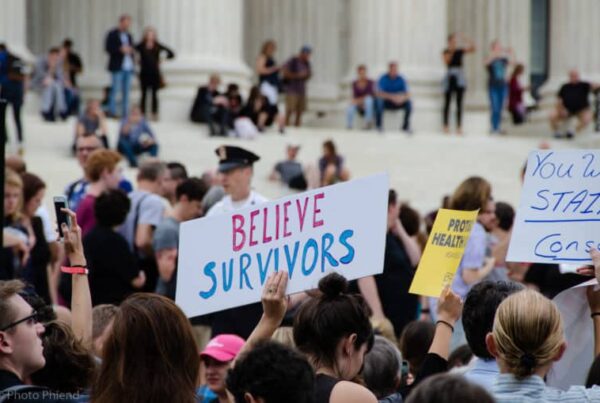By Diane Wong
October 26, 2020
On Tuesday, June 23 members of the Freedom Inc. Freedom Youth Squad organized a slow car procession down Park Street in Madison, Wisconsin. Afterwards, youth leaders gathered for a socially distant rally to pressure the Madison School Board to remove police from schools. One week later, the Madison School District Board of Education voted unanimously to terminate its contract with the Madison Police Department. This victory was a culmination of four years of queer Black and Southeast Asian youth organizing around police violence and accountability as part of their “No Cops in Schools” and “Police Free Schools” campaigns.
The murder of George Floyd and the uprisings that followed afterwards raise critical questions about what defunding the police could look like on the ground, and the role of cross-racial solidarity in a new moment of racial reckoning. For Asian Americans, there is a long history of entanglement in policing that demands deeper interrogation. In fact, the recent uprisings and rebellions have revealed a complicated relationship between Asian Americans and the policing of Black communities, with Thou Thao, a Minneapolis police officer who stood by and watched George Floyd die at the hands of his colleague, Chinese American NYPD officer Peter Liang who shot Akai Gurley and Oklahoma City police officer Daniel Holtzclaw who violently targeted and assaulted dozens of Black women. This has propelled a national dialogue about Asian American complicity in anti-Black racism and the need for Asian Americans to divest from the desire to be in proximity to whiteness and to instead cultivate an ethics of care and kinship with Black communities.
There are also counterstories of insurgency like the Freedom Inc. Freedom Youth Squad, made up of Southeast Asian youth who have for years organized alongside Black youth and spent hours of community engagement, public testimony, political education, and protest to win police free schools. As Kabzuag Vaj, co-executive director of Freedom Inc. expressed: “We can no longer stand by as Asian Americans and let Black people put their bodies on the line for a win that we’re going to benefit from. This is our liberation too and got to define what that means. A world without policing is a world that Asian Americans need and want.” In a Police Free Schools: Political Education and Action livestream, Mahnker Dahnweih, Director of Community Power at Freedom Inc., expressed the importance of youth cross-racial solidarity: “These youth have been in these ad hoc committees and in school board meetings for years presenting data, statistics, stories, meeting and consulting with other national organizations, with movement lawyers. This is a time where we need to center youth voices and follow their leadership.”
In addition to calling for the removal of police from schools, the Freedom Youth Squad have also demanded the city invest in Black youth and youth of color with resources, time and money. These demands are in alignment with our most recent GenForward survey data from August on policing. Majorities of young adults expressed support in putting the budgets of police departments entirely or partly toward other areas such as healthcare, education or housing — 75% of Asian American and 60% of Black youth support putting the entire budget of police toward social services. In addition, 85% of Asian American and 77% of Black youth support the creation of a new agency of first responders that would specialize in deescalation of violence, providing mental health support, and other social services that would take over the responsibilities from the police. In a #DignityInSchools video series, Selena of the Freedom Youth Squad expressed a need for cities to start: “Investing in Black students and youth of color means providing them with culturally specific counselors and teachers and teaching them history that they want.”
The most recent GenForward data on policing illustrates that there are more parallels between Black American and Asian American youth when it comes to questions of policing and the logics of defunding the police. In terms of police presence in high schools, 58% of Black youth and 55% of Asian American youth supported terminating ties with the police. When asked about funding for the police, 52% of Black youth and 47% of Asian American youth advocate for decreasing funding for the police. Interestingly the numbers change when the question shifts to ask about abolition, only 10% of Asian American youth answered in support of abolition as compared to 21% Black youth who believe police departments should be abolished. Importantly, the work of Freedom Inc. reveals how transformative changes around policing are forged from the ground up—through insurgency, resistance, and the fundamental belief that an alternative world without police is not only possible but that youth are already building that vision.
The GenForward Survey is associated with the University of Chicago. August 2020 responses were collected July 24th, 2020 through August 6th, 2020, among a nationally-representative sample of 3,115 young adults between the ages of 18 and 36. The overall margin of sampling error is +/- 2.54%.
Diane Wong is an Assistant Professor in the Department of Political Science at Rutgers University, Newark. Her interests include American politics, Asian American activism, gender and sexuality, comparative immigration, race and ethnicity, cultural and media studies, and community rooted research. As a first-generation Chinese American born, raised, and based in Flushing, Queens in New York City, her research is intimately tied to the Asian diaspora and urban immigrant experience. Her work has appeared in Urban Affairs Review, Women’s Studies Quarterly, Amerasia Journal, Asian American Policy Review, and a variety of edited book volumes, journals, anthologies, podcasts, and exhibitions. Diane is a socially engaged artist and organizer, she is co-founder of The W.O.W. Project, a youth-led initiative based out of Wing On Wo & Co. the oldest store in Manhattan’s Chinatown that uses art activism to combat gentrification. Learn more about Diane & the GenForward researchers here.
More Perspectives



